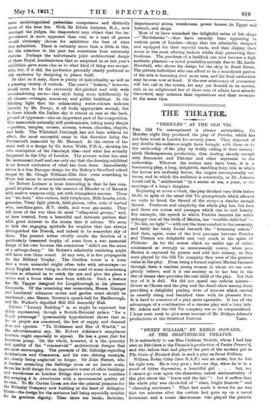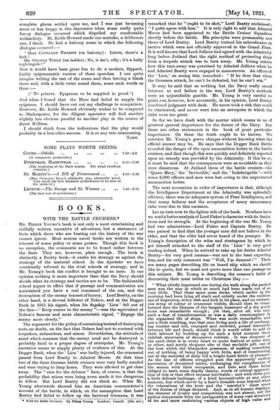" SWEET WILLIAM," BY KEBLE HOWARD, AT THE SHAFTESBURY THEATRE.
IT is melancholy to see Miss Cathleen Nesbitt, whom I had last seen as Belvidere in the Phoenix's production of Venice Preserv'el, and who before that had played the part of the modern girl in The Grain of Mustard Seed, in such a play as Sweet William. William Robin Crisp (late R.A.F.) was an artist, but he lost his right arm. He is very poor ; but one day, when he is in a mood of bitter depression, a beautiful girl . . . but, no, I cannot go over again the shameless, naked sentimentality cf this plot about the " brave and the fair " I Let it suffice that the whole play was chock-full of " clean, bright humour " and " charming sentiment." What had made it worse for me was that ten minutes after the curtain had gone up on a naval lieutenant and a comic charwoman who played the pianola
complete gloom settled upon me, and I was just becoming more or less happy in this depression when some really quite fur.,:iy dialogue occurred which dispelled my comfortable melancholy. Mr. Keble Howard made one mistake, a deliberate one, I think. Ho had a balcony scene in which the following dialogue occurred :- "Miss CATHLEEN Num.= (on balcony) : Listen, there's a lark !
Ms. GEORGE TULLY (on ladder): No, it isn't, silly; it's a belly nightingale I"
Now it would have been great fun to do' a modem, flippant, highly epigrammatic version of these speeches. I can quite imagine writing the rest of the scene and then leaving a blank there and, with a little twist round them, some such words as these :— (" To printer. Epigrams to be supplied in proof.")
And when I found that the Muse had failed to supply the epigrams, I should have cut out my challenge to comparison. However, Mr. Keble Howard obviously wishes to be compared to Shakespeare, for the diligent spectator will find another slightly less obvious parallel to another play in the course of Sweet William.
I should think from the indications that the play would probably be a box-office success. It is at any rate unassuming.
TARN.



































 Previous page
Previous page